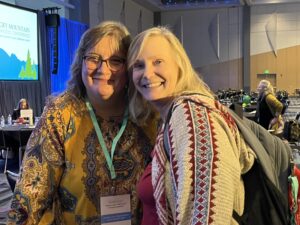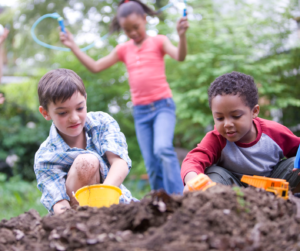
by Vangi McCoy, Cohort 1, Montelores Early Childhood Council, Coordinator
Cathrine Floyd, Cohort 1, Trust for Learning, Director of Ideal Learning Initiatives
As Buell Leaders, we continuously strive to create more equitable systems for young children and their families. One area that has seen widening gaps in racial disparities is nature-based, outdoor learning. Even though there has been a 200 percent increase in outdoor programs for preschoolers, the demographics of participants has not changed. In short, Black and Brown children have been unable to access these programs at the same rate as their white peers due to program fees, hours and locations. Even though many of us are disconnected from our natural world, this disconnection is often tied to historical and present inequities in under-resourced communities.
 The cost of this disconnect is high, especially for children. Overwhelming and well-documented research demonstrates that experiences in nature promote physical, cognitive, and emotional well-being—lifetime building blocks for development. Yet, young children, who delight in the natural world, are increasingly separated from nature and learn largely within the four walls of their schools and child care settings. Today’s children spend less than half the time playing outdoors than their parents did (National Trust, 2018). Being outdoors gives children a chance to learn about and consider risk. Risk is an important part of child development because children need to learn about going beyond their limits to experience growth. Risky play in the early years represents a safe form of risk taking. Naturally as adults, it’s uncomfortable and frightening for your children to be in any perceived danger. However, climbing trees or playground structures, splashing in a stream or picking wild fruit are opportunities to experience nature in their own ways. Consider some of your favorite childhood memories. Often those memories include being outdoors. By considering the benefits of time outdoors, we give our children a chance to make memories of their own.
The cost of this disconnect is high, especially for children. Overwhelming and well-documented research demonstrates that experiences in nature promote physical, cognitive, and emotional well-being—lifetime building blocks for development. Yet, young children, who delight in the natural world, are increasingly separated from nature and learn largely within the four walls of their schools and child care settings. Today’s children spend less than half the time playing outdoors than their parents did (National Trust, 2018). Being outdoors gives children a chance to learn about and consider risk. Risk is an important part of child development because children need to learn about going beyond their limits to experience growth. Risky play in the early years represents a safe form of risk taking. Naturally as adults, it’s uncomfortable and frightening for your children to be in any perceived danger. However, climbing trees or playground structures, splashing in a stream or picking wild fruit are opportunities to experience nature in their own ways. Consider some of your favorite childhood memories. Often those memories include being outdoors. By considering the benefits of time outdoors, we give our children a chance to make memories of their own.
Childhood’s growing disconnection from nature has many causes, including safety concerns, limited access, the disappearance of open green spaces, social, political, and cultural factors, the influence of technology, and systemic environmental injustices against communities of color. Despite these challenges, we see encouraging tendrils of re-connection.
We stand at a critical moment to advocate for equitable access to nature-based early childhood education initiatives in service of all children and communities. Here are some ways to learn more and how to get more involved:
Trust for Learning’s newest resource: Nurturing All Children in Nature
Louka Parry’s Podcast featuring Cathrine Floyd
Hunt Institute Webinar: Promoting Nature-Based Learning in the Early Years
Rusty Keeler: Risky Play
